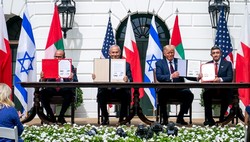The leaders of Israel, Bahrain, and the United Arab Emirates met at the White House on Sep. 15 to sign a treaty recognizing Israel’s sovereignty and normalizing their relations with it. The treaty known as the Abraham Accords (after the Biblical/Koranic patriarch), marks the first time in decades that two Arab countries officially established diplomatic ties with Israel.
There were many positive reactions to the ceremony. Abdullah bin Zayed Al Nahyan, the United Arab Emirates’ minister of foreign affairs, publicly stated, “I stand here today to extend a hand of peace and receive a hand of peace.”
In addition, Israeli Prime Minister Benjamin Netanyahu said, “This is not only a peace between leaders. It’s a peace between peoples. Israelis, Emiratis, and Bahrainis are already embracing one another.” Since Bahrain and the UAE signed the treaty, Israel promised to end establishing settlements in the West Bank.
“The signing of the Abraham Accords at the White House was important but not a great surprise” noted Saliba Sarsar, Ph.D., a Professor in Political Science whose expertise is in Middle Eastern politics and Palestinian-Israeli relations. “It resulted from a three-year effort by the United States and facilitated by years of silent cooperation between the State of Israel on one hand and some Arab states, such as the United Arab Emirates and Bahrain, on the other.”
“What must be pointed out is that the Abraham Accords does not equate to a peace treaty. Israel on one side and UAE and Bahrain on the other have never directly warred against each other. The treaty does not end other ongoing conflicts in the region,” he explained. “What it does is realign relations and the balance of power in the region in order to outdo Iran and occasionally Turkey to halt their interference in Middle East affairs.”
Critics of the deal have said representatives from the State of Palestine should have been involved in the treaty. Professor Sarsar believes that the deal could possibly weaken the idea of a two-state solution and slow compromises between Israel and Palestine.
Rabbi Yaakov Greenberg, an Adjunct Professor in Religious Studies and Advisor to the Chabad club, said he was pleased to see peace in the region. He said, “Anytime there is peace between two countries is an amazing thing, especially countries that never had a relationship before.” He added, “It shows other Muslim countries that peace and relationships can be made with Israel.”
Greenberg said he has heard positive feedback from the treaty. “Yes, for the Jewish community this is big news, and many are very happy about it. This is, of course, what I hear from Jews that care a lot about Israel.”
Shalom Shaffer, a sophomore biology student with a concentration in biomedical sciences, also thinks this is a large step for Israel’s future. He said, “I believe that both Israel and the Arab world has much to gain from this deal. By acknowledging that Israel is here to stay and not going anywhere, they have come to the table to make a deal as the idea of destroying Israel fades.”
President Donald J. Trump is being considered as a Nobel Peace Prize nominee due to his policy decisions in the Middle East and Kosovo. Shaffer responded, “What most people do not talk about is the foreign policy of the Trump Administration. This is the first modern-day administration that has not started any wars, just for that he deserves to win. I certainly think Trump deserves this award.”
Shaffer added, “I believe another reason why many Arab countries want to make peace with Israel is because of the failed foreign policy of the Obama Administration. The Obama Administration made a deal with Iran, giving them $1.6 billion. Many Arab countries looked to join up with Israel for cooperative security. This is another reason why the deal was able to be made.”
Professor Sarsar hopes following this agreement, Israel and Palestine will continue to resolve current issues and arrive at peace. He pleaded, “Mediation and negotiation would fulfill the spirit of the Abraham Accords and contribute to the actualization of its vision, mainly advancing “peace, security, and prosperity in the Middle East and around the world.”
IMAGE TAKEN from USA Today



